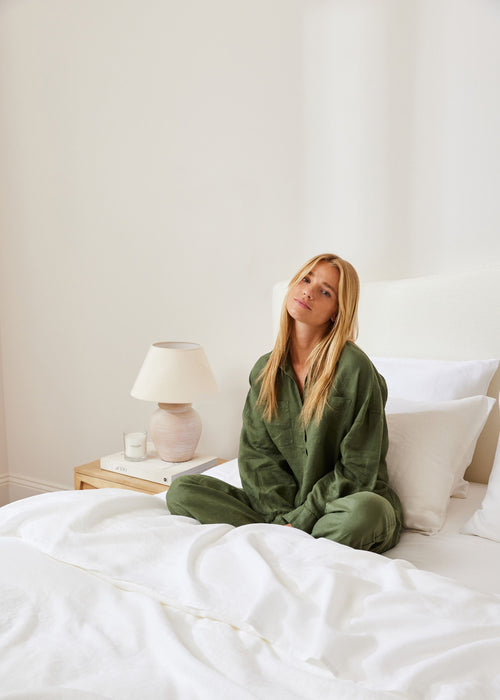
I’ve Helped 580,000 People Sleep – Here’s What I Know About Sleep Resistance
Battling with bedtime procrastination? This is how to break the cycle.
We’ve all been there. Fighting off sleep even when we know we desperately need it. Despite our best intentions, we resist rest, falling into the familiar cycle of groggy days and nights spent mindlessly scrolling or binge-watching a show we’re not even invested in. It’s a struggle that leaves us frazzled, drained, and longing for more meaningful moments of rest.
Nearly half (48%) of all Australian adults report at least two sleep-related problems, highlighting how pervasive this cycle has become. From difficulty falling asleep to waking up feeling unrefreshed, these challenges are impacting not just our nights but our ability to thrive during the day.
But what if we could break the cycle?
As someone who teaches people all around the world about healthy habits like mindfulness, meditation and gratitude, it surprises me that when my husband travels for work, I stay up until after midnight binging Netflix.
As I’m tucked up in bed with my laptop, this tug of war plays out. One inner voice says, ‘go to sleep, you’ll be tired and grumpy tomorrow’ while the other voice chimes in, ‘but you deserve this time to yourself, it’s so rare, binge another episode.’This internal struggle is what researchers have termed ‘bedtime procrastination,’ a concept introduced in a 2014 paper to describe the habit of delaying sleep despite no external reason to stay awake
The conflict between what we know is good for us and what we think we deserve plays out in other areas of our lives too, not just sleep.
‘Don’t have that extra glass of wine, you’ll be hungover tomorrow’ is met with ‘you’ve had a big week, you deserve to relax and unwind’.
‘Uber Eats will make you feel horrible afterwards’ lives alongside, ‘it’s the weekend, you’ve earned a night without cooking’.
Perhaps you are smiling as you relate to these internal conversations between your wholesome and rebellious parts?
Nourish the rebel
The problem in these scenarios is not the Netflix, wine or takeout food, it’s that we live in a culture that tells us unhealthy things are a reward for getting through ordinary everyday life.
So how can we shift our mindset so that an early night or a nutrient-dense meal feels just as rewarding as their destructive counterparts? How can we retrain our brain to get a dopamine hit from a pre-bed cuddle with our dog, a few restorative yoga poses or a guided sleep meditation?
The first step is to offer yourself some forgiveness when you succumb to unhealthy bedtime habits. Think of this rebellious part of you as like your teenage self, getting upset or being strict will only make this inner dimension even more determined.
Reframe self care
Instead, focus your attention on changing the way you perceive healthy bedtime habits. Reframe sleep hygiene from a chore (or punishment) to an aspect of your day you enjoy and even cherish.
As you hop into bed before 10pm, say something like, ‘Aren’t I lucky to be getting to bed early. It feels good to take care of my body.’ As you read instead of scrolling through social media, create an internal narrative like, ‘Reading calms my mind, I love the feel of the pages in my hands’.
Talking to yourself in this way might feel forced or silly to begin with, but before long, you will start to believe these affirmations and a positive feedback loop will be created where you look forward to these bedtime routines.
Even better, you might notice an increase in self-esteem and self-worth as you say yes to your more wholesome desires and ditch the guilt associated with giving in to your rebellious parts.
Over the years I’ve supported people all around the world to shift gears at the end of the day.
Here are three simple practices that will help you move from a racing mind, chasing dopamine and resisting sleep, to relaxing into your slumber.
I am safe
It’s not sexy, but our nervous system loves to feel safe before it drifts off to sleep, especially if it’s been in fight or flight during the day. Polyvagal theory pioneered by Stephen Porges is perhaps the most well known way of understanding our nervous system and what it needs to survive, thrive and feel connected. According to this theory, taking the time to practice small moments of feeling safe is a powerful way to regulate and experience physical and psychological wellbeing.
So before you get into bed, help your body shift into rest and digest. You can do this by casting your eye around your bedroom and noticing the features that allow you to feel physically safe. The door, roof, window and so on. Take a few deep breaths into this feeling of physical safety.
Next, scan your room for aspects that offer you a feeling of emotional safety. Pictures in frames, books, clothes and so on. Take a few deep breaths into this experience of emotional safety. Notice your body relax and your nervous system soften.
I let go and forgive myself
Does your inner critic get loud as your head hits the pillow? Mine does. It replays the conversations I had and ruminates on the tasks I didn’t get done. That’s why the bedtime practice of letting go and forgiving is so helpful. It’s easy. Identify something in your day that feels heavy, and turn it into a supportive statement.
For example, I let go of the conversation I had with my eldest child and forgive myself for reacting rather than responding. Then, as you breathe out, imagine this aspect of your day is leaving your body through your breath. Notice any feeling of lightness or relaxation that comes from letting go. Trust that this moment of forgiveness and self-compassion has relaxed your nervous system and edged you closer to sleep.
I respect the night
Darkness is good for us, supporting our circadian rhythm and our mental, physical and emotional health. In our increasingly technological world, many of us don’t experience enough darkness.
Cultivating a practice of gratitude for the wonder of the night can help to balance the scales. So tonight, why not take a few deep breaths and thank the night. You could thank it for helping your body rest and rejuvenate, for revealing the stars in the sky, for cooling down the earth or keeping animals safe from predators.
Sleep hygiene doesn’t need to feel like a chore. Have fun and get creative as you notice how safe you are in your room, let go, forgive yourself and feel grateful for the healing capacity of the night. Who knows, your inner rebellious teenager might like it too.
Fleur Chambers is an internationally recognised mindfulness teacher, the author of Wholehearted Confidence, and creator of meditation app, Happy Habit.
Create Your Sleep Sanctuary
Enjoyed This?
Explore more sleep content.











